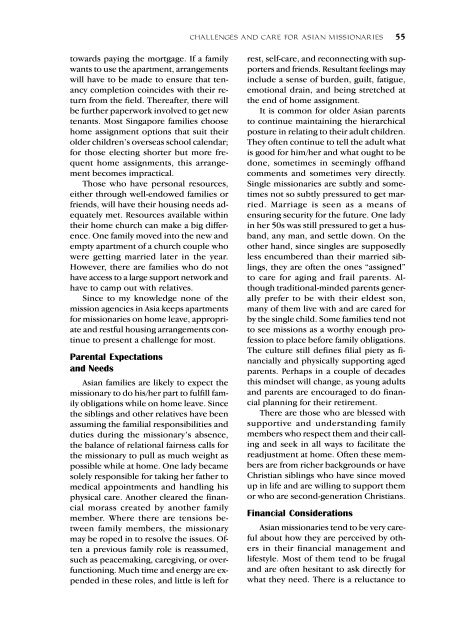Part 2 Regional Issues and Insights - World Evangelical Alliance
Part 2 Regional Issues and Insights - World Evangelical Alliance
Part 2 Regional Issues and Insights - World Evangelical Alliance
Create successful ePaper yourself
Turn your PDF publications into a flip-book with our unique Google optimized e-Paper software.
challenges <strong>and</strong> care for asian missionaries 55<br />
towards paying the mortgage. If a family<br />
wants to use the apartment, arrangements<br />
will have to be made to ensure that tenancy<br />
completion coincides with their return<br />
from the field. Thereafter, there will<br />
be further paperwork involved to get new<br />
tenants. Most Singapore families choose<br />
home assignment options that suit their<br />
older children’s overseas school calendar;<br />
for those electing shorter but more frequent<br />
home assignments, this arrangement<br />
becomes impractical.<br />
Those who have personal resources,<br />
either through well-endowed families or<br />
friends, will have their housing needs adequately<br />
met. Resources available within<br />
their home church can make a big difference.<br />
One family moved into the new <strong>and</strong><br />
empty apartment of a church couple who<br />
were getting married later in the year.<br />
However, there are families who do not<br />
have access to a large support network <strong>and</strong><br />
have to camp out with relatives.<br />
Since to my knowledge none of the<br />
mission agencies in Asia keeps apartments<br />
for missionaries on home leave, appropriate<br />
<strong>and</strong> restful housing arrangements continue<br />
to present a challenge for most.<br />
Parental Expectations<br />
<strong>and</strong> Needs<br />
Asian families are likely to expect the<br />
missionary to do his/her part to fulfill family<br />
obligations while on home leave. Since<br />
the siblings <strong>and</strong> other relatives have been<br />
assuming the familial responsibilities <strong>and</strong><br />
duties during the missionary’s absence,<br />
the balance of relational fairness calls for<br />
the missionary to pull as much weight as<br />
possible while at home. One lady became<br />
solely responsible for taking her father to<br />
medical appointments <strong>and</strong> h<strong>and</strong>ling his<br />
physical care. Another cleared the financial<br />
morass created by another family<br />
member. Where there are tensions between<br />
family members, the missionary<br />
may be roped in to resolve the issues. Often<br />
a previous family role is reassumed,<br />
such as peacemaking, caregiving, or overfunctioning.<br />
Much time <strong>and</strong> energy are expended<br />
in these roles, <strong>and</strong> little is left for<br />
rest, self-care, <strong>and</strong> reconnecting with supporters<br />
<strong>and</strong> friends. Resultant feelings may<br />
include a sense of burden, guilt, fatigue,<br />
emotional drain, <strong>and</strong> being stretched at<br />
the end of home assignment.<br />
It is common for older Asian parents<br />
to continue maintaining the hierarchical<br />
posture in relating to their adult children.<br />
They often continue to tell the adult what<br />
is good for him/her <strong>and</strong> what ought to be<br />
done, sometimes in seemingly offh<strong>and</strong><br />
comments <strong>and</strong> sometimes very directly.<br />
Single missionaries are subtly <strong>and</strong> sometimes<br />
not so subtly pressured to get married.<br />
Marriage is seen as a means of<br />
ensuring security for the future. One lady<br />
in her 50s was still pressured to get a husb<strong>and</strong>,<br />
any man, <strong>and</strong> settle down. On the<br />
other h<strong>and</strong>, since singles are supposedly<br />
less encumbered than their married siblings,<br />
they are often the ones “assigned”<br />
to care for aging <strong>and</strong> frail parents. Although<br />
traditional-minded parents generally<br />
prefer to be with their eldest son,<br />
many of them live with <strong>and</strong> are cared for<br />
by the single child. Some families tend not<br />
to see missions as a worthy enough profession<br />
to place before family obligations.<br />
The culture still defines filial piety as financially<br />
<strong>and</strong> physically supporting aged<br />
parents. Perhaps in a couple of decades<br />
this mindset will change, as young adults<br />
<strong>and</strong> parents are encouraged to do financial<br />
planning for their retirement.<br />
There are those who are blessed with<br />
supportive <strong>and</strong> underst<strong>and</strong>ing family<br />
members who respect them <strong>and</strong> their calling<br />
<strong>and</strong> seek in all ways to facilitate the<br />
readjustment at home. Often these members<br />
are from richer backgrounds or have<br />
Christian siblings who have since moved<br />
up in life <strong>and</strong> are willing to support them<br />
or who are second-generation Christians.<br />
Financial Considerations<br />
Asian missionaries tend to be very careful<br />
about how they are perceived by others<br />
in their financial management <strong>and</strong><br />
lifestyle. Most of them tend to be frugal<br />
<strong>and</strong> are often hesitant to ask directly for<br />
what they need. There is a reluctance to
















